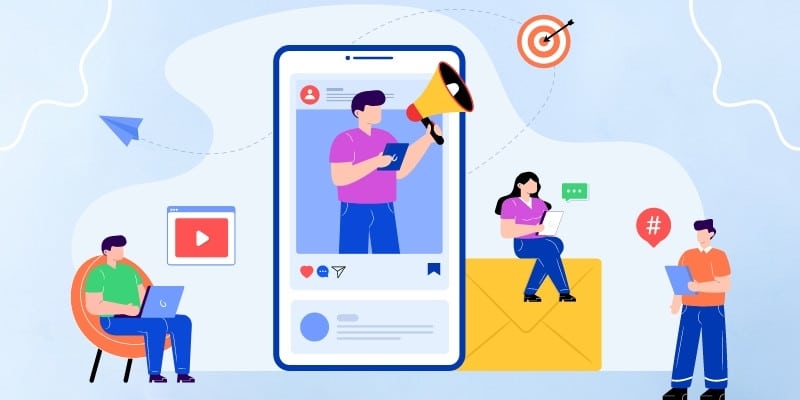It is a reality. We live glued to mobile phones, and more and more people are looking for information about products and services that interest them directly from their smartphones through mobile applications.
Taking into account that, according to statistics from last year, 92% of users who search from their mobiles end up buying or visiting an establishment, it is not surprising that mobile applications have become one of the most popular marketing tools. effective for companies to relate to their customers
Table of Contents
Mobile First Indexing: What is It and Why?
Before getting into the subject and analyzing why Apps have become practically essential in a marketing strategy for any type of business, it is important to know what Mobile-First Indexing is and why Google has changed its way of ordering web pages.
The reason is simple. Google lives from user searches, and it’s not a secret.
As in recent years, there has been a trend; seeing that users now carry out most searches via smartphone and not from the computer, Google has decided to reward companies that offer a good mobile experience.
This is the reason why, in July 2018, Mobile First Indexing came into force, the new Google algorithm that orders the search results of users prioritizing web pages in their mobile version.
It doesn’t matter how well done a company’s desktop website is anymore because Google now sorts based on the mobile version.
And what does this Google algorithm change really imply? Mobile First Indexing means that those businesses that do not offer a good mobile experience will worsen their positioning and will not be found by users.
At least not so easily as the search results that appear on the first page of Google get 91.5% of the clicks.
But Google has not only reordered the search results but has also created a new technology called PWA (also known as Progressive Web Apps) that guarantees the best mobile experience, achieving a longer permanence time, better results, and an increase in user loyalty.
PWAs offer an optimal user experience because they bring together the best of web pages and the best of native applications.
On the one hand, PWAs do not need to be downloaded from Google Play or App Store since Google shows them in its search results, and, on the other hand, they have advanced functions typical of native Apps such as sending push messages, geolocation, store online and order system with payment gateway, among others.
As you can see, Google is “punishing” businesses that are not Mobile Friendly and that do not offer a good user experience on mobile devices.
Now that you know this, it is time to analyze in depth why mobile apps currently play a key role in a Marketing strategy.
Why Are Mobile Applications Important in a Marketing Strategy?
- Acquisition
- Experience
- Loyalty
- Promotion
Mobile applications are powerful Holistic Marketing tools because they help any type of company to grow in an integral way, enhancing each of its business areas: acquisition of new customers, loyalty, experience, and promotion.
The holistic growth cycle is set in motion in the acquisition phase, when a business website is connected to a Progressive Web Application or, if the business does not have a website, the PWA is activated directly.
From this moment, the PWA begins to register visits, and, part of these visits, the native App is downloaded on their mobile phones.
Then the experience phase begins. Users, who already have the Application on their mobile phones, begin to enjoy the benefits that it offers.
A Mobile Application can offer a lot of added value to users, such as additional information, exclusive offers, the possibility of making quick orders, easy reservations, easy access to a calendar of upcoming events, etc.)
Once the users already know the App and have acquired a product or service through it, it is about making them come back, activating the loyalty phase.
Loyalty to people who have already bought and who know the brand is 7 times cheaper than acquiring new customers for a company and generates up to 95% more revenue.
Any business can build customer loyalty effectively by using the systems integrated into the Application, such as coupons or loyalty cards.
A follower of a brand is a happy customer, a customer who will speak positively of the business if they have had a good experience and if they have the opportunity to tell about it.
And here begins the promotion phase. A Mobile Application that has an automated system for generating positive reviews takes advantage of the moments of greatest customer satisfaction in the App and invites them to leave a positive evaluation that will be published in the main review portals.
According to a Harvard Business School study, each additional star on review portals such as Google My Business, Facebook, Yelp or TripAdvisor represents an increase of between 7-9% in a business’s turnover because it favors the “call effect” and will make more users decide to try the brand, encouraged by the positive comments of others.
In addition, Google takes into account the wave of positive reviews that a business can achieve with its Mobile Application and rewards the companies with the best score by placing them among the first search results.
Higher-ranked businesses will have higher visibility on Google than others, and more visitors will come to your website (and enjoy a great mobile experience thanks to your PWA).
Some of them will download the native App, and this cycle of holistic growth starts again.
Benefits of Mobile Applications

The benefits of including a Mobile Application within a Marketing strategy are several and very important.
As we have seen, mobile Apps favor the holistic growth of any business by promoting customer acquisition, improving the user experience, increasing the level of customer loyalty as well as the promotion they make of the business.
In short, thanks to an Application as a Marketing tool, a business can achieve:
- Optimize your SEO positioning in search engines.
- Multiply the number of new customers.
- Improve your online reputation by posting positive customer reviews.
- Find effective loyalty ways to keep your customers coming back.
- Offer the best user experience to your customers.
- Reduce costs by being able to automate some processes with the Application, such as, for example, the order or reservation system.
- Increase your income.
- Have more direct communication with your customers.
Custom Mobile Applications vs App Builders
Until a few years ago, hardly anyone knew how to create mobile apps without making a large financial investment and many months of development.
Companies that wanted to have their own mobile Application had to resort to custom technology and hire the services of a developer with programming knowledge.
These types of projects usually take about seven months and have a high cost of around €20,000, at least, in addition to the fact that any type of change that you want to make to the App afterward requires an additional cost.
With this scenario, only large corporations with high budgets could afford to have their own Mobile Application, while small businesses were at a competitive disadvantage by not being able to benefit from mobile technology.
However, approximately five years ago, the pre-developed technology that has allowed SMEs to join Mobile Marketing and grow their business thanks to a Mobile App came to light.
This situation has changed with the arrival of some SaaS (Software as a Service) companies, including Scoreapps, which have App builders with the code already created that allow anyone, without programming knowledge to create their App easily. and intuitive in a matter of hours.
Platforms that use pre-developed technology with drag and drop systems, have many advantages when developing a mobile application:
- Reduced development time.
- Decrease in errors.
- No technical knowledge is necessary.
- Customizable templates.
- Optimized mobile applications can be created for Android, IOS, and PWA.
- Changes are visible in real-time.
- Analytics section.
- It evolves at the same time as technology.
- Self-managed platform.
What Technology is the Best for an SME?
None is better than another; they are different. While the bespoke technology allows you a very high level of customization, the pre-built technology also offers the possibility to customize different templates according to the requirements of each business.
And, perhaps most importantly, at a much lower cost, the pre-developed technology allows incorporation of all the functionalities that SMEs need to grow.
Now that you know the importance of mobile applications (Mobile Apps) in the Marketing strategy of any business and the different technologies that exist to create Apps, it is up to you to assess if you are interested in joining Mobile Marketing and if you think that an Application It would be well received by your customers.
If you want to know more about how to adapt your content to mobile use, visit our post on responsive design.







